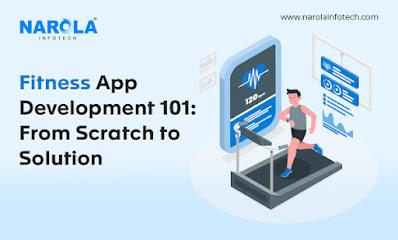
“Why do you need an app for something?” Well, an average user spends over5 hoursevery day using their favorite apps. Google processes more than 8.5 millionsearches each day. Also, over63%of organic US traffic comes from mobile devices. It clearly implies that an average user turns to the web (specifically their phone) for finding solutions to everyday problems. It sounds ironic, but even for seeking fitness advice, they turn towards the smartphone that actually made them unfit. So, if you’ve been thinking of investing infitness app development, there are healthy chances of its success.
In this blog, let us tell you EVERYTHING you need to know about building and launching a fitness app that meets the modern-day expectations of a user.

Even industry behemoths like Apple and Amazon are always putting new ideas into practice in order to stay on top of fitness trends and support their users’ efforts to lead fitter lives. Thus, not only should you invest in a feature-rich, engaging fitness app but also think of ways it would be better/different than the existing players in the industry. Fret not. Throughout this blog, we would answer some of the most important questions about fitness mobile app development (even the ones you did not ask). And in the end, you will be all set to execute your plans.
What’s the Hype About Making a Custom Fitness App?
The market statistics clearly state that the demand for fitness apps is real. Industry giants are also part of the competition, and people are actively looking for workouts, tips, and guidance for a fitness-oriented routine. Not only do you need to offer appropriate solutions to users’ problems but also seek ways to stay ahead in the competitive market. Well, the latter is the key to the former.
So, How to make a fitness app that leaves an impression on the target audience and gives you a competitive edge over industry mates?
People face a lot of challenges throughout their fitness journey. The key to a successful app is resolving these checkpoints using a tailor-made solution. Here’s a list of some common challenges that people face and how a customized app can help to overcome them:
- Lack of Time and Motivation
- Stuck With Strenuous Exercising
- Inability to See Progress
- Gym Affordability
- A Gym Trainer

Types of Fitness Apps You Can Build
As a mobile app development company, we meet a lot of clients who want to create fitness apps. However, the majority of them are unsure of the type of application they want. Before you hire developers and hand over the project to them, you must be prepared with a clear requirement. Here are some popular fitness app ideas for you to consider:
1. Health and Fitness Tracker
2. Workout Apps

3. Diet and Nutrition Apps
4. Yoga and Meditation Apps

5. Sleep Tracker

Features Can Be Game Changers
While all competitors are working with a similar concept that revolves around fitness, your app’s features can help users solve some of their crucial problems differently. In the end, it’s all about the ease and experience that your fitness app offers. Believe us when we say, do not rush this process. Make sure your app has all the features (basic ones especially) to solve users’ problems in real time.
What is the core features a fitness app should have?
Here’s a list of key features that will make your fitness app a complete solution.

1. User Profile Creation
2. Fitness Tracking
3. Goal Setting
4. Workout Programs
5. Setting Reminders
6. Nutrition Tracking
7. Social Sharing
8. Customer Support
core features, there are some more features you can implement in your app to offer even better experiences:
- Compatibility with wearables
- GPS tracking for outdoor workouts
- Heart rate monitoring and calorie counting
- Rewards or Badges
- Forums and message boards
- Meal plans, recipes, and blogs
Additionally, there are some modern aspects of fitness app development that you must pay attention to. Utilizing these advancements within your app can yield great results for you and the users. One such element is AI (Artificial Intelligence).
Artificial Intelligence (AI) for Fitness Apps
Using AI in fitness apps is a benefit in a lot of ways:
- Highly personalized user experience with the help of real-time data
- Accurate recommendations which lead to better user satisfaction
- Leverage the data to support marketing and expansion
- Smooth management of the online and offline fitness guidance
AI makes it possible to pursue the client-centric approach with the help of the extensive data it collects. With the help of the right algorithms and smart use of information, you can reach out to the target audience and offer them an exclusive, personalized experience.
Understanding Fitness App Development Process
Do you think it’s a lot of information to grab at once? Thank you for making it this far through the blog. But we don’t want you to miss out on important information and make mistakes that you regret later. So, the best advice we can give now is to read further.
Developing a fitness app has a process similar to any other mobile app with a slight difference in the industrial concept. Moreover, many companies prefer developing an MVP (Minimum Viable Product) to ensure that things are going on the right track.

Earlier in one of our previous blogs, we have already discussed the mobile app development process in detail. So, for now, we’ll just brief you about it along with some additional steps that would help you monetize and expand your app in the future.
Here are some of the key steps for building a fitness app:

Step 1: Analyze App Idea and Other Requirements
Step 2: Finalize the Features of Your Fitness App
Step 3: Choose a Monetization Method
You could be developing a fitness app to support your existing brand or gym chain. There are a lot of ways you can expect and yield revenue from it. Some of them include:
- In-App Purchases
- Freemium Model
- Ads-Based Model
- Partnerships and Sponsors
Step 4: UX and UI Design For the App
Step 5: Mobile App Development (Coding)
With the help of a reliable mobile app development company, now it’s time to work on the actual development of your fitness app. In a few discussions with the team, you will have to decide on the technologies that will be used. Further, the developers with respective skillset can start coding for the app.
Step 6: App Launch and Performance Analysis

Step 7: Integrating Your App With Wearable Devices
To make sure that your target audience can easily access your fitness app, it’s important to integrate it with wearable devices. It’s one of the best ways to keep the users engaged with your app.
29.9% of people use smart wearables
Thus, if you focus on user engagement and accessibility of the app, integration with wearables is likely to play a major role. The growing wearables market size is an indicator that this is something you must not skip.
To understand the development process in more detail, Read Our Blog.
Fitness App Development With Narola Infotech
While you are seekingfitness app developers to rely on, we can be the ones you trust. Discuss your project with us, and we will provide you with the best solution according to your requirements and development budget. Feel free to reach out for any queries or services.
Source: Fitness app development Steps

